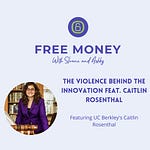If you’d prefer to watch this episode on video, click here!
The agricultural system was designed for economic efficiency, not resilience.
This means that everything from the crops we grow to the places we grow them is worth revisiting as we hurtle into a future that’ll be indelibly shaped by climate change.
Jed Wheeler at the Manzanita Cooperative joined this episode of Free Money to dive into why this matters and what he’s doing about it.
We won’t spoil the episode by telling you that his method involves a wonderful mix of hardcore crop science (domesticating native crops through gene-informed rapid breeding) and paying attention to often-ignored resources, like the nutrient-rich acorns that can be found throughout California.
Long-term investors have begun getting interested in “natural capital,” otherwise known as the air, water, soil, flora, and fauna that comprise our ecosystem. In many cases, their approach centers on mitigating the risks to these crucial resources posed by their holdings.
That said, our conversation with Jed is meant to demonstrate that there are more direct ways to invest in natural capital. Like many things that are indelibly tied to places, ther agricultural system is immensely complex and infinitely varied.
Top-down programs that incentivize certain activities — like reduced interest rates for farmers that use sustainable practices — are certainly meaningful and should be expanded. But they are quite a bit different than the imaginative work that Jed and his colleagues are doing at Manzanita.
Because think about it: mitigating the harms of an existing system is a fundamentally different activity than reimagining it. So as you listen to this episode, I hope you’ll see the way Jed is finding local opportunities to address global problems and spend some time thinking about the ways you might be able to do something similar.










